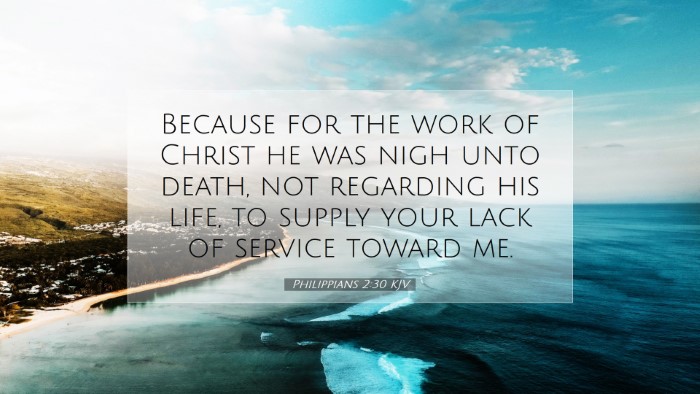Commentary on Philippians 2:30
Verse: "Because for the work of Christ he was nigh unto death, not regarding his life, to supply your lack of service toward me." (Philippians 2:30)
Introduction
The Apostle Paul's letter to the Philippians reflects his deep affection for the church in Philippi and his pastoral concern. Within this epistle, particularly in Philippians 2:30, Paul highlights the sacrificial commitment of Epaphroditus, showcasing a model of Christian service that resonates deeply with key biblical themes of sacrifice, service, and partnership in the gospel.
Contextual Analysis
This verse occurs in a section where Paul is sending Epaphroditus back to the Philippian church after he had served as a messenger and minister during Paul’s imprisonment. Understanding this context sheds light on the gravity of Epaphroditus's service, which warrants a leave from close companionship to attend to the needs of the broader church community.
Key Themes
- Service for Christ: Paul emphasizes that Epaphroditus's actions were rooted in service to Christ. His willingness to risk his life reflects the profound nature of servitude in the Christian life, where believers are called to selflessly engage in labor for the Kingdom.
- Courage and Sacrifice: The phrase "nigh unto death" illustrates the perilous nature of Epaphroditus’s mission. It reflects a motif present in various Pauline writings, where suffering and risk are associated with faithful ministry.
- The Importance of Community: The relational dynamics in the church are clear in this verse. Epaphroditus’s role was crucial in addressing the Philippian church's "lack of service," highlighting the interdependence of the body of Christ.
Commentary Insights
Matthew Henry: Matthew Henry emphasizes Epaphroditus’s selfless conduct, which stands as a beacon of Christian service. He interprets this narrative as a call to believers to prioritize the work of the Gospel above personal comfort, epitomizing true discipleship.
Albert Barnes: Albert Barnes focuses on the implications of risking life for Christ, arguing that every believer is called to a level of sacrifice. He underscores that Epaphroditus’s commitment was not merely a duty but a deep-seated love for both Paul and the church, establishing a model for enduring faithfulness.
Adam Clarke: Adam Clarke provides a detailed examination of the conditions that might have led to Epaphroditus's near-death experience. Clarke posits that the stress of ministry, combined with the obligations to the Philippians and Paul, pushed him to the brink. His commentary urges modern believers to recognize the toll of ministry and service on one’s health and vitality.
Theological Reflections
This verse invites deeper theological reflection on several fronts:
- Christ's Sacrifice: The connection between Epaphroditus’s sacrifice and the ultimate sacrifice of Christ is vital. It serves as a reminder that our service should mirror the sacrificial love that Christ displayed on the cross.
- The Nature of Christian Ministry: This verse emphasizes that ministry is not without its challenges. It counters the modern notion of a comfortable Christianity by instilling a sense of urgency and earnestness among believers today.
- Health and Spiritual Well-being: There is a delicate balance between service and health that is worth discussing. This text encourages believers to serve diligently while also being aware of their physical and spiritual well-being.
Practical Applications
For pastors, theologians, and students of the Bible, Philippians 2:30 serves as a foundational text for discussing practical faith applications:
- Encouragement to Serve: Use the example of Epaphroditus to motivate congregations and communities to engage in service that is costly and selfless.
- Care for the Servants: Emphasize the need for supporting those in ministry, acknowledging that their health and well-being are crucial to the health of the church.
- Vision for Sacrifice: Promote a theology of sacrifice that aligns the church’s mission with the sacrificial nature of Christ’s love, inspiring believers to participate wholeheartedly in the work of the Gospel.
Conclusion
Philippians 2:30 encapsulates the essence of Christian service, characterized by selflessness and a heart committed to Christ and His Church. The insights from historical commentaries enhance our understanding of the text, urging contemporary believers to rise to the challenge of sacrificial living. In navigating the demands of ministry and life, may the example of Epaphroditus inspire us to be steadfast in fulfilling our roles in the body of Christ, always seeking to serve, even at personal cost.


